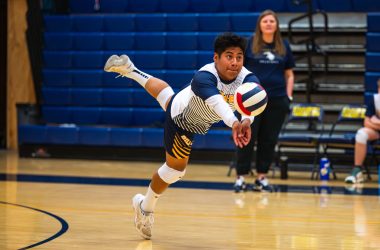
In both races, runners form a tight pack. Running in a pack allows trailing runners to ”draft” off of front-runners. Drafting is a means of conserving energy, and sometimes racers take turns at the front. In-race awareness to avoid hazards and coordinated efforts of other runners is also essential. A lot is going on.
Contact is possible, even strategic, and runners need to avoid getting boxed in, jostled, tripped, nicked by errant spikes or hit with an occasional elbow. A slip-up in the 800 will likely doom a runner’s chance at victory, but in the 1500 a small mishap might be overcome.
In the early days of Hayward Field, runners passed through a tunnel beneath the grandstand, and I’ve heard of ”muggings” away from the prying eyes of umpires. The runner who entered the tunnel in the lead did not always emerge with it.
Pace (the speed of laps) is critical. Some runners want a slower pace, hoping to conserve energy for an all-out closing kick. Others want a faster pace, hoping to ”burn out” the reserves of those who plan to kick to the finish. All runners begin with a plan that may be as simple as ”just compete” or ”run your race,” but every race is unique, and runners adjust physically and mentally.
In the final half-lap of a tightly clustered 800- or 1500-meter race is where things get interesting. If you’re in the stands, get your binoculars out and stay focused on the pack because here is when runners ”make their move,” and both gamesmanship and speed are required.
If running ahead, the runner must know who is coming and position themselves to make being passed by a trailing runner harder. Still, they must do so without illegally impeding another runner. A runner coming from behind has the advantage of seeing who is in front of them.
Passing others and being passed have psychological effects that may be uplifting for the overtaking runner or demoralizing for those being passed.
Also, by the end of all middle-distance races, runners must battle muscle fatigue.
My tip for appreciating a middle-distance race: keep your eyes on the pack, not just the frontrunner.
HOW THE RACE IS RUN
Middle-distance races are complex because they involve tactics, strategy, honor and even deception. Matt Centrowitz, the reigning 1500-meter Olympic gold medalist from the University of Oregon, is considered an excellent race tactician and says the race is “more mental than physical.”
VIDEO OF THE WEEK
Check out an insightful video on YouTube regarding endurance, stamina and speed. Search for Matthew Centrowitz.







